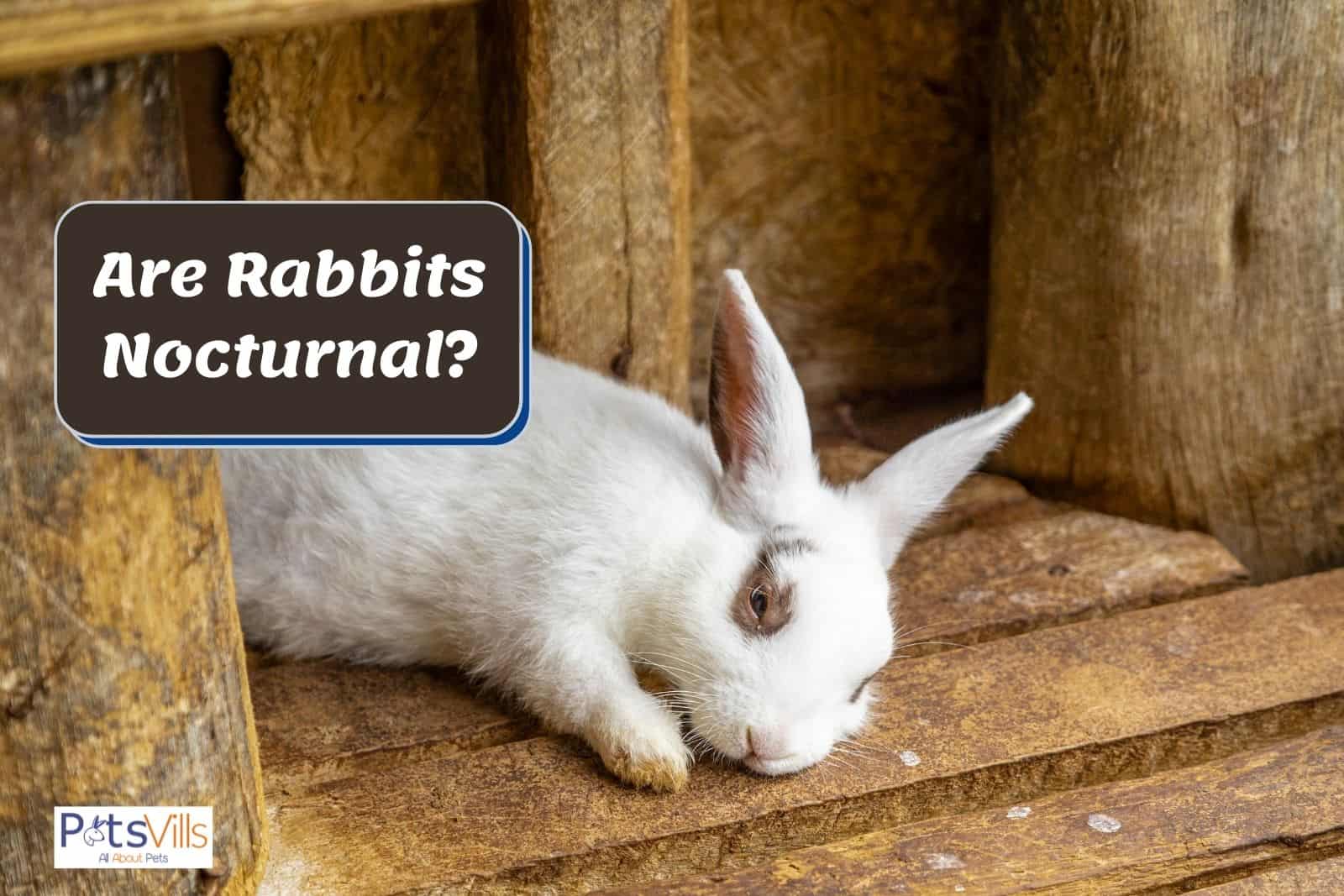Rabbits are well-known for their endless energy. So, if you want to have a rabbit as a pet, you better be ready to deal with high activity at unusual times of the day.
Are rabbits nocturnal? Rabbits are not nocturnal but crepuscular instead. That means that they are most active at dusk and dawn.
This also means that rabbits have some unusual sleeping patterns. This article will discuss these sleeping patterns and help you make your rabbit sleep tight.
READ MORE: How Long Do Rabbits Live?
Table of Contents
Are Rabbits Nocturnal?
No, rabbits are not nocturnal animals; they are crepuscular [1] and most active at dawn and dusk.
If you have a rabbit for a pet, you probably notice that they are often awake at night, which is why many people think they are nocturnal.
However, they are also often awake early in the morning, which makes them crepuscular instead.
Watch this video!
What is Crepuscular?
Crepuscular is primarily used in relation to animals to describe animals active at dusk when the sun is setting and at dawn when the sun is rising.
There are many reasons why animals adapt to this particular lifestyle. Some animals do it in the wild to avoid predators since some predators have a hard time seeing at dusk and dawn because of the light conditions.
Other animals may be active during these hours because it is much more relaxed than during the day, especially those animals that live in deserts and other areas with extremely high temperatures.
Why Are Rabbits Crepuscular?
It’s impossible to point out a single reason why rabbits are crepuscular because many factors spurred this genetic adaptation.
However, the main reason lies in the fact that rabbits are prey animals, hunted by cats, foxes, raccoons, badgers, ferrets, hawks, owls, snakes, etc.
Since they are so low on the food chain, any advantage, no matter how small, meant the difference between life and death for many rabbits.
Rabbits that were crepuscular had a slightly better chance of survival, and with time, most rabbits adapted to this lifestyle.
The advantage that crepuscular life gave to rabbits was that many predators, especially birds, are nocturnal or diurnal.
That meant that wild rabbits were reasonably safe from the active predators during the day or during the night.
Unfortunately for rabbits, there were still a few predators left that were also crepuscular as well, like various cat species.
Watch this adorable bunny!
@oreo.thebunnyrabbit Sleepy bunny 🐰 #bunny #bunnyrabbit #bunniesoftiktok #cute #fyp #cutebunny #cutepets #sleepy #sleepingpets #rabbit #bunnylove
♬ The Cuppycake Song – Buddy Castle
The Differences Between Nocturnal, Crepuscular, and Diurnal
Most animals have specific and regular activity patterns. They sleep at certain times of the day, and they are active at other times when they hunt or look for food.
These activity patterns are usually classified into three main kinds – diurnal, nocturnal, and crepuscular.
Nocturnal:
Nocturnal animals are active during the night and sleep during the day. Their eyes have adapted to give them excellent night vision to look for food or hunt in darkness. [2]
Nocturnal animals also have a well-developed hearing and sense of smell, making it easier for them to function in the dark. Nocturnal animals include owls, coyotes, beavers, badgers, hyenas, bats, etc.
Crepuscular:
Crepuscular animals are most active at dusk and dawn. Most people don’t distinguish between crepuscular and nocturnal animals, but that’s a mistake since these animals have different sleeping patterns.
Crepuscular animals are active at dusk and dawn because it increases their chances of survival against predators or helps them stay cool if they live in warm climates where days are extremely hot.
The list of crepuscular animals includes rabbits, chinchillas, hamsters, ferrets, guinea pigs, dogs, cats, skunks, capybaras, etc.
Some animals are classified as nocturnal but borderline crepuscular, like lions, jaguars or minks.
Diurnal:
Diurnal animals [3] have the same activity patterns as humans – they are active during the day and sleep at night.
Diurnal animals are not adapted to darkness, and their senses are all at their highest during the day.
Some diurnal animals include squirrels, gorillas, chimpanzees, elephants, hawks, and most birds, especially songbirds.
ALSO CHECK: Do Bunnies Blink?
Rabbits Sleeping Schedule
So, now you know that rabbits are crepuscular. However, keep in mind that not all rabbits have the same schedule. That being said, the usual sleeping schedule of rabbits can be a bit hectic for owners:
- Sunrise – Your furry friend should be up with dawn. Rabbits are commonly full of energy at dawn. They may run around their enclosure, dig around, play or groom themselves. Of course, they will also have a good appetite at this time of day.
- Morning – By morning, your rabbit should be tired and ready for its nap. Some rabbits may come out for a snack but they will typically continue to enjoy their sleep well into the afternoon.
- Afternoon – Afternoon is perhaps the prime sleeping time for rabbits. They may be taking a nap in the morning, but they will sleep firmly in the afternoon.
- Sundown – Once they get well-rested from all the sleep, rabbits once again become fairly active at dusk. Just like they did at dawn, they will eat plenty, groom themselves some more and play.
- Evening – In the evening, most rabbits will still be awake and active. Evenings are also the best time to let your rabbit out of the enclosure and let it get some exercise.
- Night – Your bunny will probably stay awake longer then you do. Rabbits don’t usually go to sleep before midnight. Some rabbits may even stay up later than that. However, once they go to sleep, they will sleep tight until dawn, when they will wake up and repeat their daily routine.
Here’s a video on how do rabbits sleep.
Can You Change Your Rabbits Sleeping Schedule?
Rabbits are naturally inclined to sleep during the day and late at night and awake at dawn and dusk. This is a part of their DNA, brought on by years of evolutions. So, changing their sleeping schedule is not possible.
You may be able to achieve some success by changing your rabbit’s feeding time, or you can try to change their light schedule to make it coincide with the human day and night schedule.
However, these tactics rarely bring success, and when they do, it’s unclear whether they can have some health consequences on your rabbit.
After all, multiple studies have shown that working night shifts is bad for the health of humans [4]. Changing your rabbit’s sleep schedule may have the same effect.
One thing is sure, however – trying to change your rabbit’s sleeping patterns will not put it in a good mood. Please don’t wake up your rabbit to try and change its sleeping schedule that way.
Rabbits are often aggressive when woken up and may even bite if you wake them up during their daytime nap.
Changing their sleep schedule can also affect their health and introduce stress and anxiety. It is recommended that you let them sleep when they want to sleep for a happy rabbit.
Also Check: Best Toys For Rabbits
Why Do Rabbits Sleep During the Day?
Rabbits are prey animals in the wild, so they need to be in a constant state of alertness.
Avoiding predators is not easy, so years of evolution turned rabbits into crepuscular animals.
That means that rabbits often sleep during the midday when most predators are least likely to hunt.
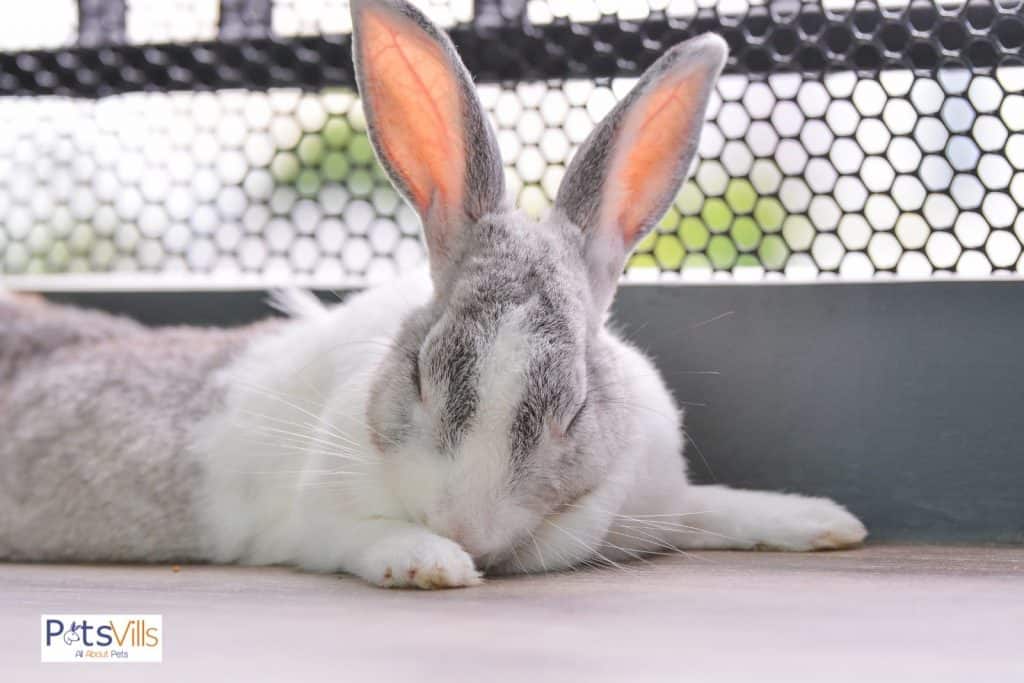
However, that’s not enough to make rabbits safe, which is why rabbits are capable of sleeping with their eyes open [5].
If your bunny sleeps with its eyes open, that’s nothing to worry about. It is just a natural way for rabbits to stay alert to potential danger.
Once your rabbit starts to feel comfortable and safe in its environment, it will be able to sleep tightly, with its eyes fully closed.
Until then, be patient and make sure not to do anything that might make your rabbit feel scared to sleep with its eyes closed, like waking it up, for example.
How Long Do Rabbits Sleep For?
How long do rabbits sleep? It’s not easy to say precisely how much rabbits sleep because that depends on a few factors, especially on the rabbit’s state of mind.
For example, a relaxed rabbit that feels comfortable and safe will undoubtedly sleep more than an anxious or scared rabbit.
Rabbits sleep for 6-8 hours a day [6].
Relaxed rabbits may sleep longer than that, up to around 10 hours a day.
However, rabbits are crepuscular, which, as we know, means that they are the most active at dusk and dawn.
That’s why they often sleep in short bursts, taking regular naps instead of just sleeping for hours straight.

How long will a rabbit sleep also depends on the species? Wild rabbits have a somewhat different sleep pattern than domestic rabbits, especially during summer when it is mating season.
Rabbits tend to sleep less during the mating season since they usually court their mates at night.
Where Do Rabbits Like to Sleep?
Wild rabbits prefer to sleep in burrows, warrens, and other deeply nested areas.
These areas give them a necessary cover to protect them from predators and elements, especially when it’s too hot.
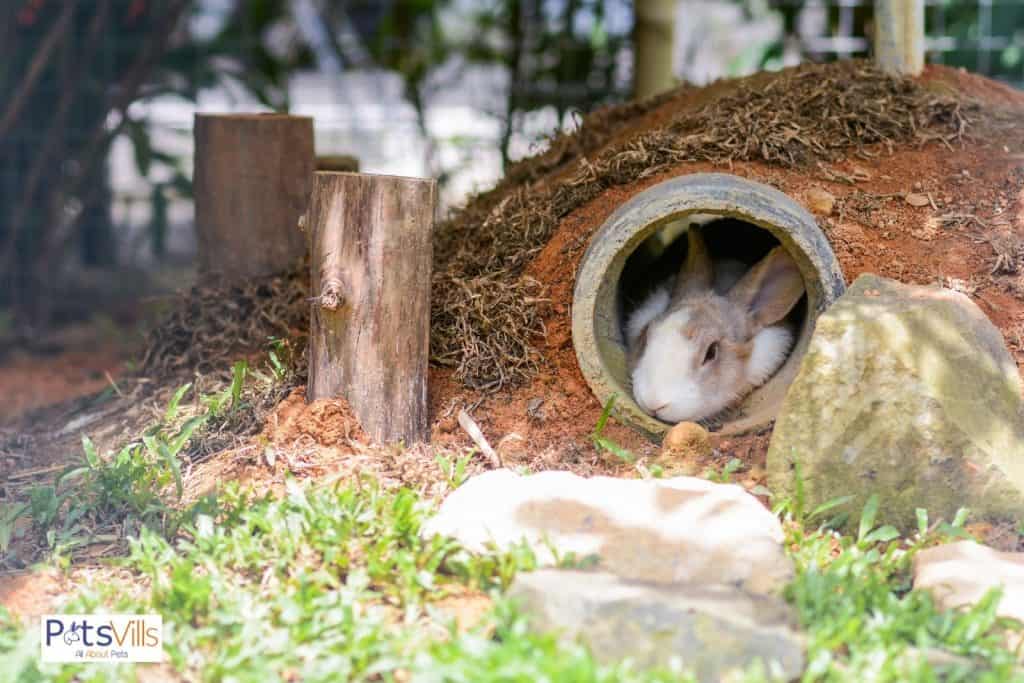
Domestic or pet rabbits sleep in cages or hutches, usually in an enclosed, dark area.
It is vital to make your rabbit’s living area as comfortable as possible to mimic the conditions from the wild. You can do this by adding extra hay and bedding.
Can My Rabbit Sleep in My Bed?
Some owners prefer to sleep with their rabbits. While this may seem like a good idea for those owners who like to cuddle with their pets, there are a few things they should consider first.
Your rabbit should be well-trained and feel comfortable around you for this to work. It should also be clean and healthy.
However, even if all the conditions are met, there are still potential problems you may face if you let your rabbit sleep with you in the bed:
- Rabbits are crepuscular animals and their sleep schedule is different than ours. They will wake up and look for something to do, so you may be woken up by your rabbit biting you to get your attention.
- Your rabbit’s fur can cause respiratory or allergy problems, even if it is completely clean.
- You could hurt your pet inadvertently while you sleep. They are delicate creatures, especially smaller species of rabbits.
- Your rabbit may fall off the bed if it rolls over in its sleep. You may want to put a mattress next to the bed to soften the blow if that happens.
- Your rabbit may use the bed as a toiled, especially if it isn’t trained to do its business in one specific place.
If your rabbit is kept outdoors, it isn’t uncommon for their fur or feet to become a bit dirty, so make sure they aren’t dragging in any dirt into your bed before you let them sleep there. Keep in mind that your rabbit may not want to sleep there, so don’t force them.
Although some rabbits, especially house rabbits, love to be stroked and cuddled, some might enjoy it. It depends on the rabbit and its personality.
Should Your Rabbit Sleep Outside?
Rabbits can sleep outside, but you need to take the necessary precautions to ensure their safety and comfort.
The first thing you need to worry about is its safety. Rabbits are known for getting easily frightened, which in many cases can lead to death if they get too scared.
Outdoor rabbits are much more likely to die from predators, so you must secure their cage and make it hard for animals to break it and kill/eat your rabbit, but more importantly, a rabbit that feels secure and safe is much happier.
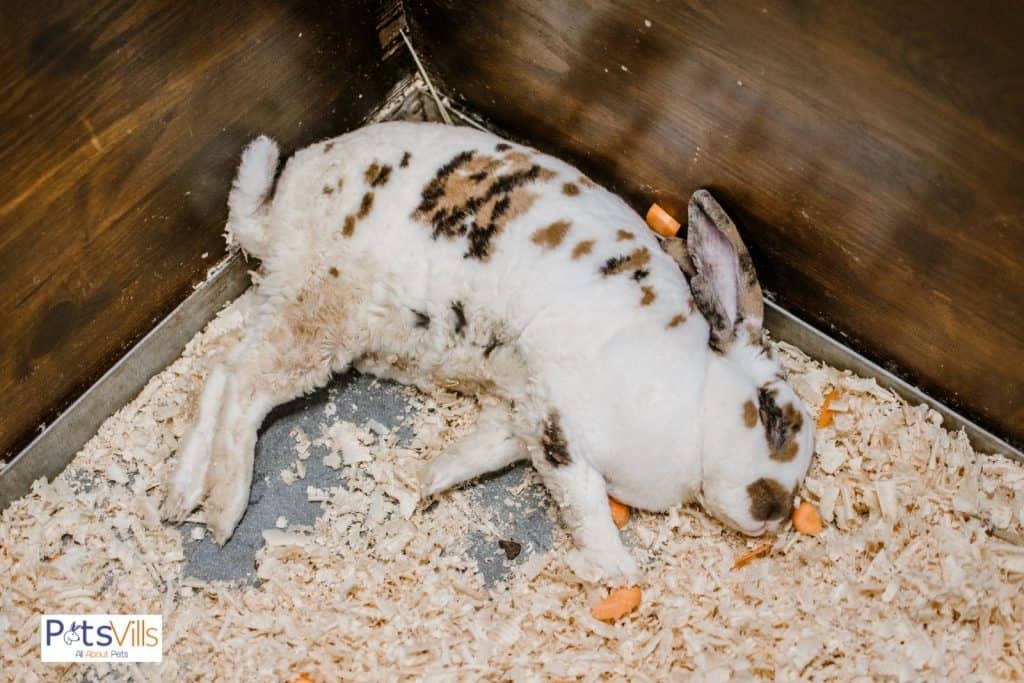
If your rabbit is sleeping in its cage outside, make sure that predators can’t easily approach it. For example, you can keep the cage off the ground or cover it with mesh on all sides.
Some rabbit owners like to add a rug or cloth over the sides of the cage at night, so the rabbits cannot see the outside if there’s a predator around. Just the sight of predators can frighten rabbits and cause stress.
It would be best to make sure that their doors have padlocks on as animals such as foxes have been known to open the wooden doors.
The cage should also be fastened to the ground to prevent any animals or the wind from knocking it over.
Some cage roofs fold up, so it is also a good idea to add a heavyweight to the top so it cannot be opened.
Ensure that your rabbit has all the essentials at its disposal, like food and water. A litter box should also be a part of its living area.
Sleeping outside during winter can be tricky because of the cold. Make sure that your rabbit has a nesting box with an entrance to have cover from the elements.
Line its cage and nesting box with warm and soft bedding.
How Can I Help My Rabbit Get Better Sleep?
To ensure that your rabbit is getting enough quality sleep, you need to make it feel safe and comfortable.
That includes a healthy diet, plenty of exercise and play, regular vet check-ups (at least once a year), and, of course, a comfortable and secure living environment.
The best way to ensure your rabbit is comfortable in its hutch or cage is to provide the appropriate bedding.
You can use straws or hay since this will keep your rabbit comfortable and allow it to nibble on them as well.
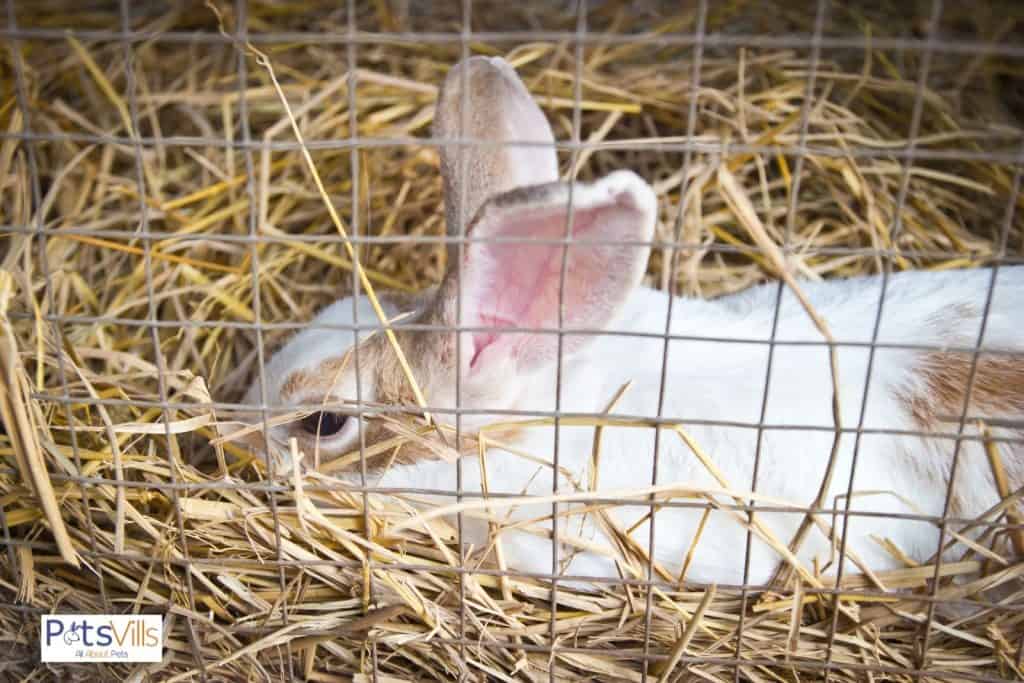
FAQs
How long do rabbits live?
Rabbits in the wild usually live 1-2 years. Pet rabbits, however, have a longer life expectancy since they live 4-7 years in most cases. Some pet rabbits may even live to be ten years old or more.
Are rabbits sociable animals?

Yes, rabbits are very sociable animals. In the wild, they always live in large groups. Pet rabbits can live independently, but it is best to keep pet rabbits in neutered pairs or groups.
Are rabbits carnivores?
No, they are not. Rabbits are herbivores. They feed on hay, pellets, and vegetables. Don’t feed meat to your rabbits.

How long does your rabbit sleep? Please let us know in the comment section below!
Resources
- 1. Jilge B. The rabbit: a diurnal or a nocturnal animal? Journal of Experimental Animal Science [Internet]. 1991 [cited 2022 Jan 31];34:170–83. Available from: https://pubmed.ncbi.nlm.nih.gov/1814463/
- 2. published LSS. Amazing photos of nocturnal animals [Internet]. livescience.com. 2020 [cited 2022 Jan 31]. Available from: https://www.livescience.com/photos-nocturnal-animals.html
- 3. Diurnal Animal – an overview | ScienceDirect Topics [Internet]. www.sciencedirect.com. [cited 2022 Jan 31]. Available from: https://www.sciencedirect.com/topics/biochemistry-genetics-and-molecular-biology/diurnal-animal
- 4. Are night shifts killing me? BBC News [Internet]. 2015 Jul 27 [cited 2022 Jan 31]; Available from: https://www.bbc.com/news/magazine-33638905
- 5. Disorders and Diseases of Rabbits – All Other Pets [Internet]. Veterinary Manual. Available from: https://www.msdvetmanual.com/all-other-pets/rabbits/disorders-and-diseases-of-rabbits
- 6. Suitable environment for rabbits | nidirect [Internet]. nidirect. 2019. Available from: https://www.nidirect.gov.uk/articles/suitable-environment-rabbits
Alina Hartley is a small-town girl with a ginormous love of bearded dragons. It all started with Winchester, a baby bearded who was abandoned at the shelter by his former owners because of a birth defect that caused one front leg to be shorter than the other. Alina originally went to the shelter looking for a guinea pig, but one look at Winchester and it was love at first sight. From that day on, Alina has dedicated her life to learning everything she can about bearded dragons. She loves helping new beardie parents start their incredible journey with these magnificent reptiles.
Follow her on:
LINKEDIN
TWITTER.
Read her latest articles HERE
Learn more about her HERE.

